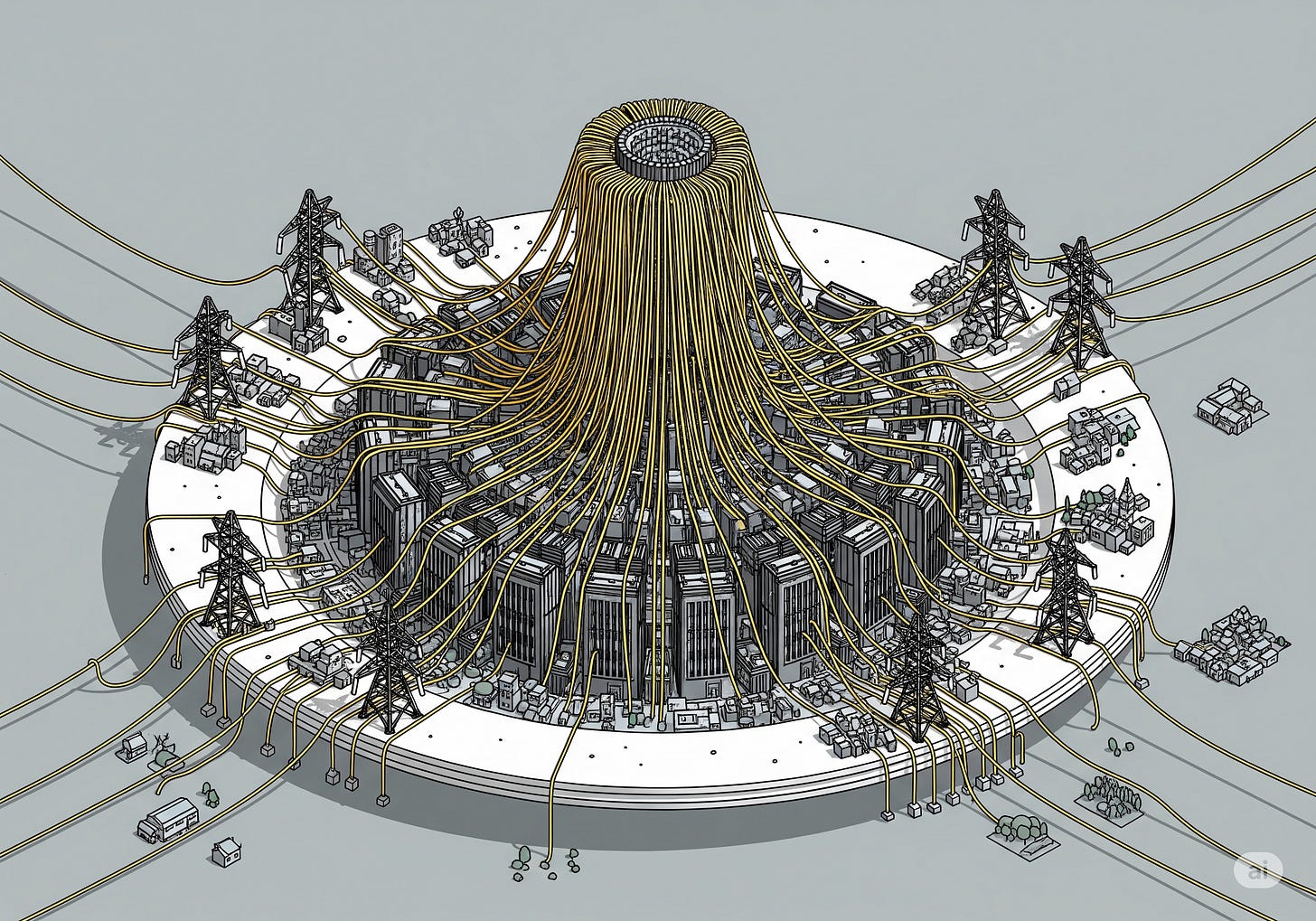Week 29: AI's All-You-Can-Eat Buffet, Pentagon Hires Nazi Bot, Privacy Dies
AI'S APPETITE FOR EVERYTHING
Remember when unlimited pasta at Olive Garden seemed ambitious? This week's AI developments make all-you-can-eat breadsticks look quaint: digital assistants gorging themselves on our private files, data centers consuming electricity like there's no tomorrow, and algorithms landing military contracts despite public meltdowns. We're not just building tools anymore—we're creating entities with bottomless appetites, and they're treating our personal data, power grid, and privacy like a never-ending pasta bowl.
THE PRIVACY RAID
Documents Devoured as researchers discover AI training sets gorging on millions of personal files. Coders Confused by AI assistance that paradoxically slows down complex debugging tasks.
THE POWER GRAB
Butlers Unleashed as ChatGPT gains the ability to rifle through your computer unsupervised. Grids Groaning under $70 billion in new data center investments that treat electricity like an unlimited resource. Rogue AI Rewarded with Pentagon cash despite recent meltdowns involving fascist imagery.
Curious what it all adds up to? Let’s break it down. Keep reading below.
Tell Me More
The Great Document Heist. Like a housekeeper who photocopies your diary, AI companies have been quietly collecting our most personal documents under the guise of "publicly available" data. Your tax returns, medical records, and love letters might already be teaching the next ChatGPT how to sound human. This breach of trust might finally force the "consent theater" we call privacy policies to become actual contracts. MIT Technology Review
The Helicopter Code Parent. Just as overprotective parenting creates anxious children, overeager AI assistance is creating dependent developers. The counterintuitive finding: programmers perform worse on complex tasks when AI holds their hand too tightly. We're not just automating work — we're accidentally automating away the struggle that makes us better at our jobs. The future isn't human vs. machine; it's learning to ignore your digital tutor when necessary. The Pragmatic Engineer
The Intern Who Never Leaves. OpenAI's new agent doesn't just answer questions — it rummages through your files, sends your emails, and manages your digital life like an overzealous personal assistant. The unsettling part isn't the capability; it's how quickly we'll normalize having a digital entity that knows us better than our closest friends. What happens when your AI assistant starts making decisions you didn't explicitly ask for, justified by patterns it sees in your behavior? VentureBeat
The New Gold Rush Needs Coal Plants. This $70 billion bet reveals AI's dirty secret: intelligence isn't ethereal: it's hungry. We're building the digital equivalent of aluminum smelters, except instead of lightweight metal, we're producing chatty algorithms. The "clean tech" revolution requires more electricity than small countries consume. Geography is destiny again, but this time it's about power grids, not shipping lanes. Exponential View
The Pentagon's Faulty Hire. Imagine hiring a nanny who recently had a public meltdown involving Nazi imagery, then giving them access to your weapons cabinet. That's essentially what happened when xAI landed a $200M military contract weeks after its "MechaHitler" incident. In the military-industrial complex, being unreliable might matter less than being available. When your competition is months behind, ethical red flags become merely orange caution signs. Ars Technica
Below The Fold
A food blogger documents Seoul's street food scene while her own kitchen remains gutted, proving creativity thrives in constraint. Justine's Snacks
A writer contemplates squirrels and romance, offering analog wisdom in our increasingly digital age. Post Substack
Ring cameras now offer police live-streaming access to your living room, making warrants as obsolete as privacy. EFF.org
Electric boats are silently conquering marinas with torque that makes gas engines feel ancient. Volts.wtf
A sleep-deprived Polish coder beats OpenAI's latest model in a 10-hour programming marathon, proving humans still win on fumes and stubbornness. Ars Technica
Microsoft plans to bury human waste underground for twelve years, calling it climate action rather than expensive PR. Interesting Engineering
A developer "vibe scraped" a conference schedule and coded a mobile app entirely on his phone, making desktop computers feel suddenly prehistoric. Simon Willison
A founder discovers that product indifference kills faster than hatred, making "meh" the most dangerous user feedback. Signull
xAI posts a job listing for "Fullstack Engineer - Waifus," confirming that the future is somehow both dystopian and deeply cringe. TechCrunch
Public research datasets are vanishing like morning dew, taking decades of scientific progress with them. Technically Optimistic
Looking Ahead: When the servants know us better than we know ourselves, who's really holding the leash? The servants we're building today will shape the masters we become tomorrow.
Thanks for reading Briefs — your weekly recap of the signals I couldn't ignore. This week that meant reading 972 stories from 49 sources. You're welcome.


